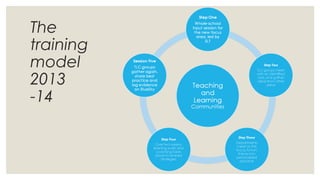
Session 1 - differentiation
- 2. DIFFERENTIATION WHAT DO WE MEAN? November 2013
- 3. We will address some key questions: 1.What is differentiation? 2.What is its theoretical origins? 3.Why is it important? 4.Does everyone agree with it? Today’s (short) session
- 5. Differentiation is a response to the fact that all students are different in a vast number of ways, some of which we can’t even detect Even in classrooms which have been ‘set’ or ‘streamed’ there can be massive variances in ability, motivation, skills and social awareness Differentiation is at the heart of twenty-first century teaching’s key principle: that all children are worth educating, without exception The principles
- 6. SO… Differentiation is… simply the ways that we adapt our classrooms, in a hundred different ways big and small, to ensure that all of the people within it are catered for One summary
- 7. ‘Differentiation is….. the process of identifying, with each learner, the most effective strategies for achieving agreed targets’. (Weston 1992) ‘Differentiation is the process whereby teachers meet the need for progress through the curriculum by selecting appropriate teaching methods to match the individual student’s learning strategies, within a group situation’. (Visser 1993) ‘Differentiation should be seen as integral to learning, not an add-on for those situations when things do not go as well as planned and problems occur. Differentiation is not about troubleshooting. It is a concept that has to be seen in an inclusive way, applying to everyone’. Other definitions
- 8. I don’t do any differentiation NOT TRUE – We all differentiate in every lesson Differentiation is something extra or additional NOT TRUE – The best differentiation is built into the classroom, used every lesson and every day Differentiation is always based on ability NOT TRUE – There are a much wider range of factors that we all consider on a daily basis Children don’t want differentiation in secondary NOT TRUE – But it has to be managed carefully Addressing some misconceptions
- 13. Experts on the brain and on learning now stress that everyone can learn more, if they are taught appropriately, whatever they have previously achieved -Geoff Petty SO… Every pupil always in focus – it is the very motto of our school Real for Heath Park
- 14. We must be clear about why we are differentiating in lessons. This will guide the way that we differentiate: To motivate? To engage? To challenge? To tick a box? “Differentiation sounds great, but on what basis are we differentiating? What do we know about this kid —and how do we know it?” (Daniel T. Willingham) Reasons we might differentiate
- 16. DOES EVERYONE AGREE WITH IT?
- 17. Carol Ann Tomlinson – in Harvard Education Letter Four “non-negotiables”: ◦a high-quality curriculum with clear goals, ◦the use of data to monitor and provide feedback on student learning ◦the ability to recognize when something isn’t gelling and modify it to fit the student ◦the creation of an environment in which students are supported and challenged She says, “These are not about differentiation. They are about a good classroom. That is good teaching.” Starting from a platform
- 18. "Different people have different learning styles - some like working with books, others prefer videos, others practical work and so on. We have to cater to them all. So now I am told by self-styled ‘experts' that my lesson plans must show ‘differentiation'. The implication being, of course, that all of my previous approaches were entirely inadequate. Differentiation is the latest buzzword to have infested education. Apparently I must use a variety of methods at every turn and I must present every topic and idea through a variety of methods and approaches. Nowhere in this obvious argument is consideration ever given to the nature of the material I am teaching. Colin Everest – ‘The Guardian’ Alternative view
- 19. ◦ Learning styles has become an influential and widely accepted idea in education. ◦ Researchers, however, are raising doubts about using these perceived differences to shape classroom decisions. ◦ There is little agreement on what learning styles actually means, according to British researcher Frank Coffield, who studied 13 instruments for determining learning styles with three other colleagues in 2004. ◦ While some researchers think of learning styles as fixed and stable qualities, Coffield says, others argue that they are context specific, shaped by previous learning experiences, and changing from task to task. Are learning styles of continued use to teachers? Learning styles discredited?
- 21. Differentiated, naturally… 1.Read the article ‘Be all things to all pupils’ and ‘Let’s all differentiate’ – staff docs, departments, l+t. 2.Make a reflective list of differentiation strategies you know of and/or have tried, and whether they worked. 3.Watch some videos on http:// www.differentiationcentral.com/videos.html . American, but don’t hold that against them! Homework options
- 22. The Spectrum of Teaching Styles developed by Mosston (1996) are described as: Style A Command: Teacher makes all decisions. Style B Practice: Pupils carry out teacher-prescribed tasks. Style C Reciprocal: Pupils work in pairs: one performs, the other provides feedback. Style D Self-check: Pupils assess their own performance against criteria. Style E Inclusion: Teacher planned and pupils monitor their own work. Style F Guided Discovery: Pupils solve teacher set problems with assistance. Style G Divergent: Pupils solve problems without assistance from the teacher. Style H Individual: Teacher determines content. Pupil plans the programme. Style I Learner Initiated: Pupil plans own programme. Teacher is advisor. Style J Self Teaching: Pupil takes full responsibility for the learning process.